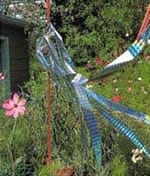
by Pigeon Patrol | Jun 4, 2014 | 4-S Gel Bird repellent, Animal Deterrent Products, Bird Deterrent Products, Pigeons in the News, UltraSonic Bird Control
 ‘Irri-tape pigeon scarer’ is a bird and pigeon control product that visually scares pigeons and birds by the use of holographic images imprinted onto a polyester film. The images resemble owl’s eyes in an interlocking pattern and the 3-dimensional holographic surface reflects the colours of the spectrum as the tape moves. Irri-tape comes in the form of a tape, normally sold in 100 foot or 500 foot rolls, that is ready for use by simply cutting to size. The tape measures 2” wide and .0001” thick. Irri-tape has a considerable number of applications and will scare a variety of bird species including waterfowl and predatory birds.
‘Irri-tape pigeon scarer’ is a bird and pigeon control product that visually scares pigeons and birds by the use of holographic images imprinted onto a polyester film. The images resemble owl’s eyes in an interlocking pattern and the 3-dimensional holographic surface reflects the colours of the spectrum as the tape moves. Irri-tape comes in the form of a tape, normally sold in 100 foot or 500 foot rolls, that is ready for use by simply cutting to size. The tape measures 2” wide and .0001” thick. Irri-tape has a considerable number of applications and will scare a variety of bird species including waterfowl and predatory birds.
Irri-tape pigeon scarer is effective, according to the distributor, because it flashes as it moves in the wind with constantly changing colours and patterns. The flashing ‘ripple’ effect unsettles the target species and is perceived as a danger signal. Viewed from a distance, Irri-tape has a reptilian sheen and as a result may be perceived as a predator by other birds, thereby scaring them. The perceived movement of Irri-tape, courtesy of the holographic images, may even be seen by the target species as a rival for food or territory.
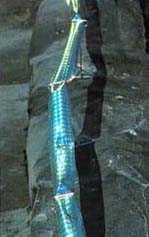
Irri-tape not only scares pest species of birds visually but also by making a metallic rattling sound when caught in the wind. The combination of audio and visual scarers in one product makes Irri-tape pigeon scarer an interesting bird control option.
Irri-tape’s applications include protecting ponds, lakes and lawns from waterfowl such as ducks and geese as well as protecting facilities such as fish farms from predation by hawks and other raptors. Irri-tape pigeon scarer can also be wrapped around tree trunks and grape vines to stop bird damage as well as commercial fruit crops and fruit and vegetable plots in domestic gardens. Irri-tape can be applied to flat surfaces such as narrow fences or ledges on buildings to stop birds such as pigeons landing and perching. The product can also be suspended above perching or roosting areas by specially designed wire supports and the main ribbon can be made even more effective by attaching 5 foot long ‘streamers’. Irri-tape can also be used to scare birds from pleasure craft moored in marinas and on roof tops to stop birds landing. The distributor even suggests that whole areas can be protected by providing a line of upright posts and ‘maypoling’ 6-10 foot strips of Irri-tape pigeon scarer to them, allowing the Irri-tape to blow freely in the wind.
Irri-tape pigeon scarer appears to be simple and straightforward to install in virtually every application and the product can be installed by a property ownerrather than having to instruct a specialist contractor. The product is relatively inexpensive to buy and is also lightweight, durable and maintenance-free.
Where urban installations are concerned, access to maintain and repair damaged tape must also be taken into consideration. Birds such as pigeons will often choose inaccessible areas to perch and roost and therefore access to these areas to both install and maintain the product may be difficult and potentially expensive. There are also many more areas on buildings where reflective tape may become ‘snagged’ on architectural features, for example, than in open-space environments such as gardens and fields. Based on the fact that most urban applications will require the product to be installed at height, the question of how the product will stand up to strong winds and gales must also be considered. If Irri-tape pigeon scarer is installed as a linear application, along a parapet wall for example, the likelihood of the product being damaged as a result of high winds is lessened, but cannot be ruled out.
Irri-tape pigeon scarer is clearly a product that deserves consideration whether it is used for the protection of gardens, crops or buildings. As with a vast majority of bird scarers, however, the product will be considerably more effective when provided as part of an overall control system rather than as a stand-alone device. There are very few products within the pest control marketplace, with the possible exception of anti-roosting spikes, that are 100% effective as a stand-alone deterrent/scarer or anti-perching device.
About Pigeon Patrol:
Pigeon Patrol Products & Services is the leading manufacturer and distributor of bird deterrent (control) products in Canada. Pigeon Patrol products have solved pest bird problems in industrial, commercial, and residential settings since 2000, by using safe and humane bird deterrents with only bird and animal friendly solutions. At Pigeon Patrol, we manufacture and offer a variety of bird deterrents, ranging from Ultra-flex Bird Spikes with UV protection, Bird Netting, 4-S Gel and the best Ultrasonic and audible sound devices on the market today.
Voted Best Canadian wholesaler for Bird Deterrent products four years in a row.
Contact Info: 1- 877– 4– NO-BIRD (www.pigeonpatrol.ca)
The information on this blog is for personal use only. Content for this blog obtained from other websites is not being used for any commercial reasons whatsoever as per the copyright statement on the Pigeon Control Resource Centre’s website. http://www.pigeoncontrolresourcecentre.org/ Special thanks for the people and companies that helped gather this information. This information is to be used for reference only.
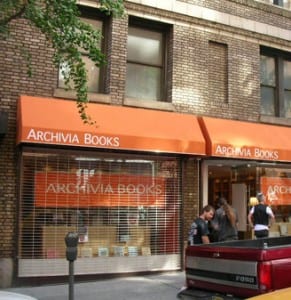
by Pigeon Patrol | Jun 4, 2014 | Animal Deterrent Products, Bird Deterrent Products, Bird Netting, Pigeon Spikes, Pigeons in the News

A 90-year-old Geneva man has been ordered evicted from the apartment he has been renting for more than 50 years for allegedly feeding pigeons on his balcony, according to a news media report.
The pensioner recently received a registered letter informing him that he had to leave the three-room flat in the heart of the city by the end of this month, Le Matin newspaper reported over the weekend.
“What’s happening to me is scandalous, unthinkable,” the elderly tenant told the newspaper.
Brolliet, the company managing the apartment building, said his lease was being terminated for “just cause”, referring to the man’s “intolerable behaviour” for feeding the pigeons after letting them come into his balcony.
The tenant, however, told Le Matin that he had not been feeding the birds since the death of his wife two years ago.
“And it’s not a crime,” he added, noting that he always paid his rent as required and even ahead of time.
The real estate management company maintains that it sent out the eviction letter after complaints from neighbours came to the attention of the building’s owners, a cooperative group.
“I don’t know how they could be so nasty,” said the pensioner, who faces a challenge trying to find another apartment for the 900 francs a month he is currently paying (including charges).
“Neighbours received pigeon droppings and and we are certain they came from his place,” Guy Tornare, head of the cooperative that owns the building, told Le Matin.
The situation has been known for many years but could “no longer be tolerated” after the building was renovated in February, Tornare said.
“I almost received (pigeon) excrement on my head during a visit,” Claude Guillod, an administrator with the coop, is quoted as saying by Le Matin.
Guillod said the bird droppings are dangerous because they can spread diseases.
“What has happened to this man is sad but it is because he has not listened that we have come to this.”
Guillod rejected the idea that the building owners wanted to get rid of the 90-year-old in order to raise the rent, saying that the issue was one of “hygiene”.
About Pigeon Patrol:
Pigeon Patrol Products & Services is the leading manufacturer and distributor of bird deterrent (control) products in Canada. Pigeon Patrol products have solved pest bird problems in industrial, commercial, and residential settings since 2000, by using safe and humane bird deterrents with only bird and animal friendly solutions. At Pigeon Patrol, we manufacture and offer a variety of bird deterrents, ranging from Ultra-flex Bird Spikes with UV protection, Bird Netting, 4-S Gel and the best Ultrasonic and audible sound devices on the market today.
Voted Best Canadian wholesaler for Bird Deterrent products four years in a row.
Contact Info: 1- 877– 4– NO-BIRD (www.pigeonpatrol.ca)
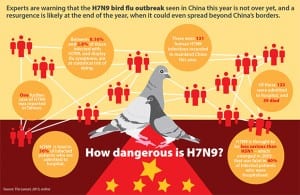
by Pigeon Patrol | May 1, 2014 | 4-S Gel Bird repellent, Animal Deterrent Products, Bird Deterrent Products, Bird Netting, Pigeon Spikes, UltraSonic Bird Control
 More than 60 transmissible diseases (some of which are fatal) are associated with geese, pigeons, starlings and house sparrows. For example:
More than 60 transmissible diseases (some of which are fatal) are associated with geese, pigeons, starlings and house sparrows. For example:
Histoplasmosis is a respiratory disease that may be fatal. It results from a fungus growing in dried bird droppings.
Candidiasis is a yeast or fungus infection spread by pigeons. The disease affects the skin, the mouth, the respiratory system, the intestines and the urogenital tract, especially the vagina. It is a growing problem for women, causing itching, pain and discharge.
Cryptococcosis is caused by yeast found in the intestinal tract of pigeons and starlings. The illness often begins as a pulmonary disease and may later affect the central nervous system. Since attics, cupolas, ledges, schools, offices, warehouses, mills, barns, park buildings, signs, etc. are typical roosting and nesting sites, the fungus is apt to found in these areas.
St. Louis Encephalitis, an inflammation of the nervous system, usually causes drowsiness, headache and fever. It may even result in paralysis, coma or death. St. Louis encephalitis occurs in all age groups, but is especially fatal to persons over age 60. The disease is spread by mosquitoes which have fed on infected house sparrow, pigeons and house finches carrying the Group B virus responsible for St. Louis encephalitis.
Salmonellosis often occurs as “food poisoning” and can be traced to pigeons, starlings and sparrows. The disease bacteria are found in bird droppings; dust from droppings can be sucked through ventilators and air conditioners, contaminating food and cooking surfaces in restaurants, homes and food processing plants.
Besides being direct carriers of disease, nuisance birds are frequently associated with over 50 kinds of ectoparasites, which can work their way throughout structures to infest and bite humans. About two-thirds of these pests may be detrimental to the general health and well-being of humans and domestic animals. The rest are considered nuisance or incidental pests. A few examples of ectoparasites include:
Chicken mites (Dermanyssus gallinae) are known carriers of encephalitis and may also cause fowl mite dermatitis and acariasis. While they subsist on blood drawn from a variety of birds, they may also attack humans. They have been found on pigeons, starlings and house sparrows.
Yellow mealworms (Tenebrio molitor), perhaps the most common beetle parasites of people in the United States, live in pigeon nests. It is found in grain or grain products, often winding up in breakfast cereals, and may cause intestinal canthariasis and hymenolespiasis.
West Nile Virus while West Nile is technically not transmitted to humans from birds, humans can get infected by the bite of a mosquito who has bitten an infected bird. The obvious lesson is that the fewer birds there are in any given area, the better. This translates into a smaller chance of an infected bird in that area, a smaller chance of a mosquito biting an infected bird and then biting a human.
About Pigeon Patrol:
Pigeon Patrol Products & Services is the leading manufacturer and distributor of bird deterrent (control) products in Canada. Pigeon Patrol products have solved pest bird problems in industrial, commercial, and residential settings since 2000, by using safe and humane bird deterrents with only bird and animal friendly solutions. At Pigeon Patrol, we manufacture and offer a variety of bird deterrents, ranging from Ultra-flex Bird Spikes with UV protection, Bird Netting, 4-S Gel and the best Ultrasonic and audible sound devices on the market today.
Voted Best Canadian wholesaler for Bird Deterrent products four years in a row.
Contact Info: 1- 877– 4– NO-BIRD (www.pigeonpatrol.ca)
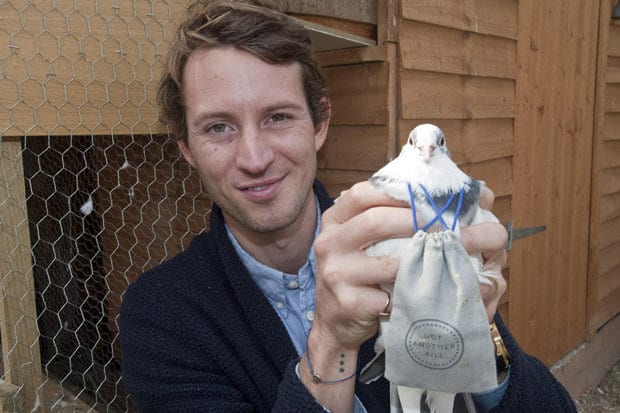
by Pigeon Patrol | Apr 7, 2014 | Bird Deterrent Products, Bird Netting, Pigeon Patrol's Services, Pigeons in the News, UltraSonic Bird Control
 Ned Corbett-Winder, 29, said his small business now cannot afford to use the regular parcel service and is now testing the new animal-based technique to save money.The owner of NotAnotherBill.com said he is standing up for the little guys and is not willing to pay the hiked prices.
Ned Corbett-Winder, 29, said his small business now cannot afford to use the regular parcel service and is now testing the new animal-based technique to save money.The owner of NotAnotherBill.com said he is standing up for the little guys and is not willing to pay the hiked prices.
He said: “Businesses like mine rely on Royal Mail and we’re at the mercy of these price hikes.
“The latest price increase will cost my business around £2,500 over the course of a year which for a small business is a huge amount of money.
“Government is supposed to be supporting small businesses but this move flies in the face of that support and I fear that with the privatisation of the Royal Mail price increases like this are going to become a regular occurrence.”
New Royal Mail prices came in to effect on Monday.
First class stamps increased by 2p to 62p and second class now start at 53p rather than 50p.
In 2012, a first class stamp cost 46p, a third less than what it is now.
Ned has taken on his new pigeon delivery service by setting up a flying route from his home in Acton, west London to a destination 59 miles away in Oxford.
The homing birds, which were used largely throughout the first and second world war, have been used throughout history to transport messages.
PIGEONS: The birds are all set up to test new routes [NATIONAL NEWS AND PICTURES]
He is now testing if the pigeons would really be reliable enough to deliver letters on a regular basis.Ned said: “People always joke that if their parcel is late it would have been quicker sending it by carrier pigeon. Well I’m testing the theory out.”
By placing food at the location, the birds have so far back and forth travelled twice a day.
They could carry parcels up to 75g with the journey taking just over an hour to get there with the birds flying over 50mph.
After Royal Mail was sold in October last year, many are saying the organisation was undervalued and taxpayers have not received enough in return.
About Pigeon Patrol:
Pigeon Patrol Products & Services is the leading manufacturer and distributor of bird deterrent (control) products in Canada. Pigeon Patrol products have solved pest bird problems in industrial, commercial, and residential settings since 2000, by using safe and humane bird deterrents with only bird and animal friendly solutions. At Pigeon Patrol, we manufacture and offer a variety of bird deterrents, ranging from Ultra-flex Bird Spikes with UV protection, Bird Netting, 4-S Gel and the best Ultrasonic and audible sound devices on the market today.
Voted Best Canadian wholesaler for Bird Deterrent products four years in a row.
Contact Info: 1- 877– 4– NO-BIRD (www.pigeonpatrol.ca) Now shipping World Wide.
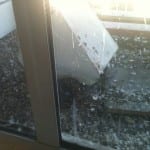
by Pigeon Patrol | Feb 18, 2014 | 4-S Gel Bird repellent, Bird Deterrent Products, Bird Netting, Pigeon Patrol's Services, Pigeons in the News
 Clean-up Procedures
Clean-up Procedures
Pigeon feces may contain bacteria and other pathogens that can cause illness. Prevent infection by avoiding direct contact with bird debris while cleaning affected areas. Keep children and pets away from areas which have accumulated bird debris.
Wear personal protection equipment (PPE) when cleaning up fecal matter
Follow these steps to clean and sanitize properly:
- Prepare a 10 percent solution of sodium hypochlorite by mixing one part bleach with nine parts water.
- If indoors, mist the area to settle suspended air-borne particles.
- Soak the area with the bleach solution and leave it undisturbed for at least 10 minutes. This will disinfect and soften the droppings, making them easy to remove.
- apply and spread the bleach solution.
- Re-wet the area with the bleach solution if the area starts to dry during the 10 minute soak.
- Dense accumulations of feces may require repeated applications of the bleach solution.
- Place the debris into a doubled plastic bag (a plastic bag in another plastic bag).
- Use a square-nosed shovel or a hoe to scrape up the debris.
- Seal both bags.
- Place bags in the outside trash.
- Using dish soap or laundry detergent, scrub the area with a stiff brush or broom to remove debris from cracks and crevices. Rinse area with water.
- A power washer can be used for this step.
- Reapply the bleach solution and keep the area wet for another 10 minutes. Do not rinse.
- If the treated area receives at least 4 hours of direct sun, this step can be omitted as ultraviolet light has disinfecting properties.
- Air-dry before allowing people and pets into the area.
This procedure may not remove all stains and the use of bleach may discolor walkways, sides of building, and other structures and may cause damage to growing vegetation. Damage may be prevented by using a commercial disinfectant without sodium hypochlorite. Read label instructions before using these products.
If a sensitive area receives a considerable amount of sunlight, the disinfectant may not be necessary as the sun’s UV light works as a natural disinfectant. Physical removal of the debris is necessary. This method is also considered acceptable for areas with little or no foot traffic.
Keep children and pets away from contaminated areas until they have been cleaned, sanitized and dried.
- If pigeon debris is in an enclosed area, such as an attic, open windows and use fans to force fresh air into the area before cleaning.
- Leave area undisturbed to prevent air-borne particles.
- Never handle a dead bird with your bare hands.
- Use rubber gloves or an inverted plastic bag to pick up the bird.
- Place the dead bird into a plastic bag, seal bag and place in an outdoor, covered trash container.
- Clothes worn during cleaning should be washed separately in hot water. If possible use a disinfectant in the wash.
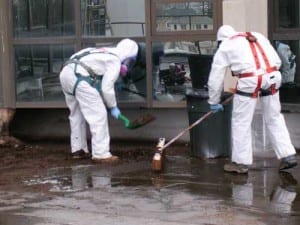
About Pigeon Patrol:
Pigeon Patrol Products & Services is the leading manufacturer and distributor of bird deterrent (control) products in Canada. Pigeon Patrol products have solved pest bird problems in industrial, commercial, and residential settings since 2000, by using safe and humane bird deterrents with only bird and animal friendly solutions. At Pigeon Patrol, we manufacture and offer a variety of bird deterrents, ranging from Ultra-flex Bird Spikes with UV protection, Bird Netting, 4-S Gel and the best Ultrasonic and audible sound devices on the market today.
Voted Best Canadian wholesaler for Bird Deterrent products four years in a row. Contact Info: 1- 877– 4– NO-BIRD (www.pigeonpatrol.ca) Now shipping World Wide.

 ‘Irri-tape pigeon scarer’ is a bird and pigeon control product that visually scares pigeons and birds by the use of holographic images imprinted onto a polyester film. The images resemble owl’s eyes in an interlocking pattern and the 3-dimensional holographic surface reflects the colours of the spectrum as the tape moves. Irri-tape comes in the form of a tape, normally sold in 100 foot or 500 foot rolls, that is ready for use by simply cutting to size. The tape measures 2” wide and .0001” thick. Irri-tape has a considerable number of applications and will scare a variety of bird species including waterfowl and predatory birds.
‘Irri-tape pigeon scarer’ is a bird and pigeon control product that visually scares pigeons and birds by the use of holographic images imprinted onto a polyester film. The images resemble owl’s eyes in an interlocking pattern and the 3-dimensional holographic surface reflects the colours of the spectrum as the tape moves. Irri-tape comes in the form of a tape, normally sold in 100 foot or 500 foot rolls, that is ready for use by simply cutting to size. The tape measures 2” wide and .0001” thick. Irri-tape has a considerable number of applications and will scare a variety of bird species including waterfowl and predatory birds.









